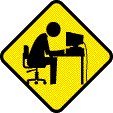Hi! Folks,
It's winter time here in Kiwiland (That's New Zealand for the uninitiated!), and with all those lurgy's floating around I thought I should weigh in with some advice against one particularly common affliction: PC Rage! Here we go…
Symptoms: This affliction is often evidenced by strange noises coming from those you know for normally being of a calm and peaceful disposition. The early symptoms are often a low mumble, which can progress into loud yelling, even screaming. This may well be followed by loud bangs, thumps and explosive sounds, even breaking glass as windows are shattered and large objects are sent hurtling into outer space!
If you have ever been tempted to enquire into these events you may find yourself in George Bush like situations, dodging that infamous shoe. Only this time it could be keyboards and other low flying objects of a technological nature.
Further enquiry will often reveal a very sick and tired computer user frustrated by their machine taking forever to start up and load programs, crashing randomly and performing other forms of unsolicited behaviour.
Prescription: I am happy to be able to prescribe cures for this affliction. Follow these steps at routine intervals and all should be well. Sadly, this is not a 'once only' cure, as the bug circulates and always returns.
Here is my prescription for curing 'PC Rage' when the symptoms become apparent.
1. Delete Temporary Internet Files. When you visit a new website as its content is stored on your PC and takes up hard drive space. Go to "Tools", then "Options" – as each browser is a bit different, click through tabs to find an option for deleting temporary files and cookies. (A cookie is a small piece of code, usually innocent, but not always, that performs certain tasks of, usually, but not always, a benign nature.)
2. Use a registry cleaner such as Registry Mechanic, or one of the excellent free versions that PC Care can install for you. Windows® registry can be a common cause of crashes, slow performance and error messages. Registry cleaners will stabilise your system and help improve its performance.
3. Ensure automatic Windows® Updates is turned on. You can turn this feature on via the Control Panel and then click on Automatic Updates to configure the settings. My recommended setting is to set Windows to download updates but for you, the user, to decide when to install. This way you will be sure of getting the updates.
4. Eliminate unused files & desktop shortcuts. Every file and application that sits on your desktop takes up extra space, delete them to free up your hard disk space. This is called 'good housekeeping' and PCs really benefit from systematic and routine cleaning.
5. Uninstall unused programs. The more programs you have installed the slower your system will become. You need to use the "Uninstall" command in the Add/Remove program feature in the Control Panel. Caution: You can't remove a program just by deleting its folder and files. Full un-installation may require the use of the registry cleaner to clean up stray references left in the Windows Registry after un-installation. Again, caution: You should consider carefully all the files your cleaner offers to remove and backup the Registry beforehand.
6. Empty the Recycle Bin. Files that you delete from your computer are still stored in your recycle bin and will continue to take up a valuable hard drive space.
7. Schedule regular anti-virus & anti-spyware scans with your antivirus programme. You do have an antivirus programme running and up to date on your machine, don't you? A quick daily scan followed by a full weekly scan is what this doctor orders. Computer viruses and spyware can take over your computer's memory and slow down performance.
8. "Defrag" your computer regularly. Each time you work with a file your computer stores changes in a different place on the hard disk. A good defragmentation tool is Desktop Maestro, or you can check with PC care for recommended free versions. Warning! Don't just download and install the first Registry Cleaner you come across (or any other programme for that matter) there are con jobs out there that masquerade as legitimate software but are, in fact, wolves in sheep's clothing! They will hijack your machine and prevent you doing any work until you pay large amounts of your hard earned dosh -and even then you won't get free of it. Alternatively, you can use the free defrag utility packaged in Windows. However, you may have to stop all running apps to prevent them writing to disc and stopping the defrag process. The Windows defrag utility can be tricky, but if you want to give this a whirl you should find it in XP under 'Accessories' from 'Start' and then 'Programmes'. For Vista it will be elsewhere.
Current Threats: For your interest here is the Current Crop of Top Threats identified by Malware Research:
• Backdoor.Emogen • Backdoor.Turkojan • RogueAntiSpyware.VirusMelt • Trojan-Downloader.Agent.VB • Trojan-DDoS.VFI • Trojan.Adclicker
Best regards,
John






No comments:
Post a Comment
Please feel free to post comments related to the subject or topic in the main post. Do not use foul or bad language or swearing, suggestive of obnoxious language. All posts failing to observe this rule will be instantly deleted. Otherwise, please agree, disagree, debate, argue, express your opinions as freely as you wish. Thank you.